A controversy erupted at St Rita’s Public School in Palluruthy, Ernakulam, Kerala, after a Muslim girl in class 8 was denied entry for wearing a hijab, violating the school’s prescribed uniform. The issue escalated with protests, school closures, and involvement of political leaders.
After mediation and government intervention by Kerala Education Minister V Sivankutty, the student’s family agreed to adhere to the school’s dress code, while the minister directed the school to allow hijabs as per stipulated colour and design.
Police protection was sought to ensure campus safety. The incident underscores tensions between religious freedom and institutional regulation in a plural democratic society.
School Uniform Versus Religious Expression
On October 7, 2025, a Class 8 student at St Rita’s Public School, a Latin Catholic Church-run institution in Ernakulam, arrived wearing a hijab along with her school uniform, a departure from the school’s prescribed dress code which does not permit headscarves.
Although she had complied with the uniform policy for months after admission, her decision to wear the hijab sparked immediate friction with school authorities. The principal, Sister Heleena Alby, stated that uniform rules are clearly communicated at admission and designed to maintain uniformity among students regardless of religion.
When the student was first asked to remove the hijab she complied, but tensions rose when she continued to wear it subsequently. The school barred her entry on October 10, leading to confrontations between the student’s father, PM Anas, and the school faculty. The father insisted on his daughter’s right to faith expression, while the school maintained adherence to its policy.
Government and Legal Intervention
The dispute attracted state-level attention, with Kerala Education Minister V Sivankutty terming the school’s denial a “serious violation” of constitutional freedoms and the Right to Education Act. The minister emphasized that no student should face hardship over religious attire in Kerala, a state known for secularism and pluralism.
Following a report by the Ernakulam Deputy Director of Education, the minister directed St Rita’s to allow the student to wear the hijab, with liberty for the management to specify colour and design, to balance religious rights and school discipline.
Parallelly, the Kerala High Court granted police protection to the school after a writ petition and plea citing concerns over threats and disturbances on the campus. The petition detailed instances of parents allegedly entering the school forcefully and verbal abuse towards the staff. Police presence was deemed necessary on reopening days to maintain order.
The involvement of political actors and community leaders further amplified tensions, with Congress MP Hibi Eden facilitating talks between the school and the student’s family, which resulted in an agreement. The father publicly announced his decision to comply with the school’s uniform policy to “avoid communal issues” and ensure peace while respecting constitutional prescriptions.
Community Reactions and Wider Context
Kerala’s rich history of communal coexistence faced a moment of strain with this event. Local community leaders hailed the peaceful resolution, stressing the importance of dialogue and mutual respect. The incident happened in a broader national context, recalling previous debates over school uniforms and religious attire, such as the Karnataka hijab controversy, yet was addressed with prompt government mediation.
The Catholic school, one of several faith-based private institutions in Kerala, asserted its autonomy in maintaining discipline and uniform policies, while balancing constitutional freedoms remains a challenge. The controversy also highlighted the fine line between religious expression and secular educational norms, raising questions about inclusivity and institutional authority.
The Logical Indian’s Perspective
This episode illustrates how deeply personal choices, like wearing a religious symbol, intersect with collective institutional norms. The Logical Indian believes that respecting religious freedoms should go hand-in-hand with preserving educational discipline, but neither should be grounds for conflict or exclusion. Empathetic dialogue, transparent communication, and willingness to accommodate within reason are essential tools in diverse societies.
Rather than viewing such conflicts as binary or zero-sum, stakeholders must approach them with kindness, patience, and a shared goal of peaceful coexistence. Schools could consider revising policies to better reflect diversity, while families should understand the rationale behind uniformity in schools. Constructive engagement, not confrontation, is the bridge to harmony.













